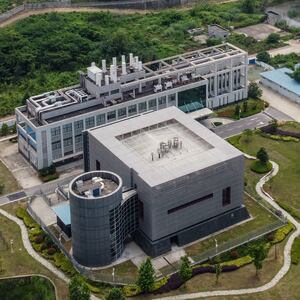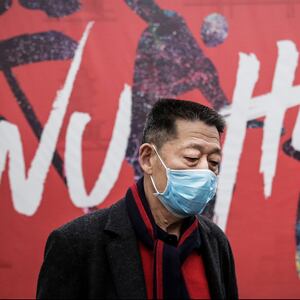By Matthew Brazil and Jeff Stein
Where is Dong Jingwei?
Rumors that China’s top counterintelligence official had defected to the United States last February reached fever pitch over the weekend, propelled largely by unfounded reports in anticommunist and pro-Trump circles that Dong had brought with him evidence that the COVID-19 pandemic had originated in a leak from a virology lab in Wuhan, not from an animal source.
The Wuhan lab leak theory has not been proven. The vast majority of researchers believe the virus leapt from an infected animal to a person, probably via Wuhan’s “wet market,” where both live and butchered meat is sold, but definitive evidence has yet to be found. The controversy has been further exacerbated by Chinese secrecy, which has aided the campaign by pro-Taiwan and Donald Trump allies to deflect blame for the spread of the pandemic away from the former president and onto Beijing.
The magnitude of the rumors about the supposed flight of Dong, 57, the number two official in the Ministry of State Security, along with his daughter Dong Yang, from Hong Kong five months ago appears to have rattled Beijing. Within 24 hours of SpyTalk’s June 17 story on the billowing controversy, China’s officially sanctioned media reported that Dong had appeared at a MSS seminar on the mainland where he “urged the country’s intelligence officers” to crack down on enemy spies, according to an account in Hong Kong’s South China Morning Post. But the reports did not say where the seminar took place, nor did they include photos or video of Dong’s supposed appearance, further raising suspicions about his status.
China is loath to admit an official’s defection.
“The CCP has never admitted any defection of its MSS officers,” Dr. Han Lianchao, a former Chinese foreign ministry official who defected after the 1989 Tiananmen Square massacre, told SpyTalk in an email on Monday. “For example, Yu Qiangsheng, who was a department-level MSS official…defected to the U.S. in 1985, but China never admitted his defection, even today.” Yu’s defection led to the FBI’s arrest of Larry Wu-tai Chin, a longtime Chinese mole in the CIA. Beijing denied any knowledge of Chin and called reports of him being their mole “fabricated by American anti-China forces,” Han said.
Dong “was last seen in public in September 2020,” Han told SpyTalk last week. Dong’s photos have been deleted by the Chinese search engine Baidu, according to some Chinese-language news reports abroad.
The absence of any photos of Dong at the supposed June 18 seminar is doubly suspicious, Han said, because Beijing has not been shy about publicizing his public meetings before. In 2018, party officials posted a photo of him in Germany, along with his boss Chen Yixin, attending a high level Sino-German security meeting. “Therefore there’s no excuse for not posting a recent photo of Dong to refute the rumor,” Han said.
In a June 16 tweet, Han, citing an unnamed source, alleged that China’s foreign minister Wang Yi and Communist Party foreign affairs boss Yang Jiechi demanded that the Americans return Dong. Secretary of State Anthony Blinken refused, Han alleged.
“My tweet about Dong Jingwei came from a source from China,” Han told SpyTalk on Monday, “and I used it to make a point that rumors are flying all over China today because the CCP’s digital dictatorship has totally stopped the free flow of information.”
Former Pentagon, State Department and CIA China expert Nicholas Eftimiades says it’s telling that “Beijing has made no flat denial and hasn't produced Dong publicly. So there is no clear indication of what's happening.” But he disputed Han’s account of Chinese censorship on the matter.
“Chinese social media shows no sign of being scrubbed of comments about Dong,” he said. “It’s full of comments about this situation.” Which leads him to suspect that reports of Dong’s defection may be false.
“If Dong really did defect, the CCP would squelch public discussion,” Eftimiades told SpyTalk. While its report of Dong attending the June 18 spy-catchers’ conference “doesn’t seem to ring true,” he added, there’s also “no sign of face-saving”—producing him in public—“in anticipation of the [party’s] 1 July CCP centenary.”
The Chinese Communist Party was founded in 1921 and took power in 1949 after a century of civil wars and foreign occupation, including the Japanese conquest that began in the 1930s and ended only with Tokyo’s surrender to the U.S. in 1945.
Beijing has not officially knocked down the rumors, and Washington is remaining mum, as is customary in defector cases.
“If the defection of Dong—a rough equivalent of the FBI’s deputy director—is real, shock waves would be felt in every corner of the Ministry of State Security,” added Eftimiades, author of Chinese Espionage: Operations and Tactics.
“The Chinese side is likely taking normal damage control action, such as pulling officers and agents out of places they shouldn’t be and assessing what harm is done should Dong tell the American all he knows,” Eftimiades said. “But his access was probably limited to counterintelligence matters and didn’t include a wider range of secrets.”
“But Beijing might have a much bigger problem on its hands,” he added. “Did Dong just decide to defect, or has he been an intelligence asset for some period of time?"
U.S. officials rarely confirm the reported defection of Chinese or other adversary officials, and for good reason.
Grim Fate of Traitors
China’s modern history is full of examples of traitors being brought to account by assassination, particularly during the revolution that triumphed in 1949. Today, a minor book and film industry in China celebrates such revolutionary justice, and unofficial outlets such as “Iron and Blood,” a military-oriented website, occasionally boast of the successful assassinations of defectors. One site posted a colorful screed about the supposed revenge mission against Yu Qiangsheng, whose defection to America led to the 1985 arrest of Larry Wu-tai Chin. A lower key Chinese account claimed that Yu was tracked down in South America two years after his defection, by a hit team of five MSS agents, who drowned him in the ocean. That account claimed that the mission commander was promoted afterward to an important position.
The Obama Administration warned China in August 2015 to cease their covert operations to track down another defector, Ling Wanzheng, who had sheltered in the U.S. China’s erstwhile communist ally Russia is notorious for tracking down and assassinating defectors.
A Western former intelligence official who served several tours in China told SpyTalk that previous major defections have caused seismic shifts within the leadership and party apparatus, bringing down senior communist officials. The last such incident was the attempted defection in 2012 of Wang Lijun (王立军), then head of the Public Security Bureau in Chongqing, China’s largest city. In that mysterious episode, Wang spent 30 hours at the U.S. consulate in Chengdu detailing widespread Chinese corruption, but was refused asylum. Wang was “never heard from again,” a former official whose responsibilities were focused on Chinese espionage, told SpyTalk. The same official said that in a previous failed defection—he was unwilling to be more specific—Beijing’s “reaction was pretty severe, both against MSS cadre (several executed) and against us.”
In 2017, The New York Times reported that China’s security forces “systematically dismantled CIA spying operations in the country starting in 2010, killing or imprisoning more than a dozen sources over two years and crippling intelligence gathering there for years afterward.”
The nongovernmental organization Human Rights in China wrote that Wang’s defection attempt “was nothing short of a big bomb that sent shock waves through the Beijing political circles. The person who took a direct hit,” it said, was “Wang’s former boss, Bo Xilai (薄熙来), the party secretary of Chongqing and aspirant for a seat in the Politburo’s nine-member Standing Committee.”
Bo Xilai is now in prison, and his rival, Xi Jinping, runs China.The former Western official further remarked that Xi Jinping himself could be at risk if Dong’s rumored defection turned out to be true. As a result of his so-called anti-corruption campaign and other moves to eliminate rivals, Xi “has developed powerful enemies inside the party,” in spite of his popularity among ordinary people.
Gordon G. Chang, a conservative Chinese American author and columnist who’s been predicting the collapse of the CCP for 20 years, told the pro-Trump NewsMax site on Saturday that Dong’s defection, if true, could “even lead to the fall of the Communist Party.”
Party Politics
U.S.-China spy wars, normally rather low-key and esoteric affairs, have turned radioactive, energized by the crosswinds of each side’s internal politics and intensifying global competition. It’s not likely that the Dong Jingwei affair will go away soon.
Imagine “the humiliation” for China “if he suddenly pops up in the American media,” said Eftimiades. “They may be gambling the U.S. won't allow him to go public, but it would be quite a humiliation for them if he did. And the likelihood is that, if the U.S. does have him, that information will eventually leak and become public.”
Co-published with SpyTalk, where Jeff Stein leads an all-star team of veteran investigative reporters, writers, and subject-matter experts who will take you behind the scenes of the national security state. Subscribe to get full access to the newsletter and website.








